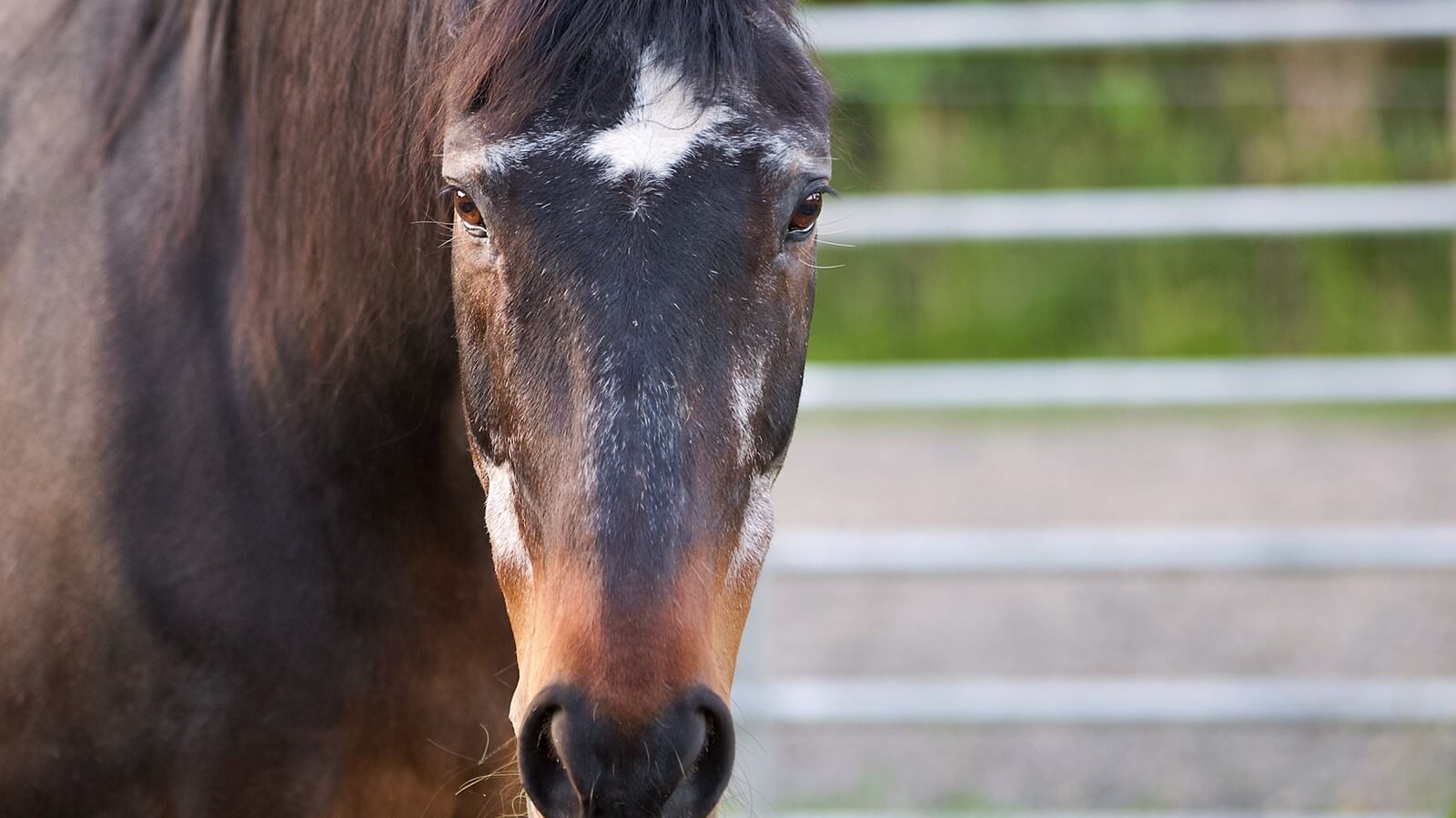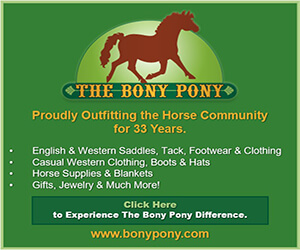Article by Jackie Bellamy-Zions for Equine Guelph
Trusty steed Sparky is ready to retire, but what exactly does that mean? Certainly, there are management changes when it comes to the senior horse. While there may be savings in some areas, there are still serious commitments of both time and finances to make sure Sparky, the once seasoned campaigner, does not suffer from preventable afflictions that come with age. Your horse may be ready for retirement, but are you ready for this next chapter in your horse’s life? (Test your senior savvy with Equine Guelph’s free online healthcare tool, the Senior Horse Challenge.) To get you started, here’s a quick quiz:
True or False?
- Senior horses require more protein than an adult horse.
- Senior horses put out to pasture no longer require vaccinations.
- Horses tend to sweat less as they get older and won’t need salt or electrolytes.
- It is easy to recognize pain in horses.
The answers are further down in this article except for number four which is quite subjective. We will discuss this one first! As a prey species, hiding pain is one of the top survival skills of the horse. Signs of pain can be very subtle like shifting away from you when being groomed but others, like nipping, are painfully obvious. Research papers are emerging to help horse owners hone their skills in this tricky area — from the Equine Facial Grimace Scale to ground-breaking work from researchers like Dr. Sue Dyson. The first clue for horse owners is often a change in behavior which frequently gets dismissed as the “new normal” or missed completely if the equine is a senior “pasture puff”.
See the pain recognition information sheet on the senior horse tool which lists rigid posture, head lowering, squinting eyes, limp ears, teeth-grinding, increased flight behavior, aggression, a decrease in responsiveness, flaring of nostrils, looking back at the flank, restlessness, stoic or pained expression, dull eyes, awkward tail carriage or aggressively swishing tail, reluctance to move, guarding part of their body or reluctance to be handled and more.
Practice Daily Diligence
A daily check is in order for all equines, even for Sparky whose main job is now to munch on pasture. Thrush could develop in hooves that are not picked daily, skin diseases sneak up quickly on the ungroomed horse, and an undetected wound can spell big trouble if it causes an infection.
Provide Regular Care
Farrier appointments are often the first cutback for the retired or semi-retired horse, but each horse is an individual and needs to be treated as such. A balanced hoof helps minimize stress on the joints and hoof structures as farrier Sean Jones points out in the Senior Horse Challenge feature video. The threat of laminitis does increase in older horses, especially if they develop a metabolic disorder such as Cushing’s (PPID). Senior hooves require extra attention and input from both veterinarian and farrier.
“Studies show one-third of laminitis cases are linked to PPID,” says Dr. Doug Myers, DVM, Boehringer Ingelheim Animal Health and sponsor of the Senior Horse Challenge tool. “The best rule of thumb is when you see symptoms of laminitis, talk to your veterinarian about testing for PPID.”
Turned Out to Pasture? Check in Frequently
There may be a temptation for owners to turn the horse out to pasture and hope all is fine, but staying on top of senior healthcare is not an occasional effort.
Body condition scoring (BSC) is a task to stay on top of with great diligence. If Sparky becomes obese, that will also put more stress on his joints increasing his risk of a developing a metabolic issue. Performing a regular BSC will also raise the red flag if Sparky loses weight. Weight can drop quickly in a senior and it can be more challenging to restore optimal body weight as sometimes there’s more than one health issue contributing to the challenge. Old age is not a valid reason for declining body condition, and it must be addressed, as is true for any animal at any stage of its life.
Senior horses often require more regular visits for dental care, modifications to their nutrition program, or a change of turn-out buddies if they are not getting their fair share of resources. They also need to remain on a parasite control program.
Sparky may not need to consume as many calories as when he was in full work but what he does consume may need to be soaked, extruded, or both to make his feed easier to digest.
Move it or Lose it
Sparky still needs the stimulation of regular exercise. Use it or lose it relates to horses just as much as humans. An unused muscle will deteriorate over time. Tendons and ligaments which have seen their fair share of work will weaken over time. The senior horse’s exercise regime should be carefully considered to encourage mobility for health without putting undue stress on old injuries or areas of weakness. Regular exercise combined with a quality protein feed is beneficial to maintaining the topline.
Exercise is also important for helping maintain healthy gut function. Lack of movement weakens muscles and bones. In many cases, mild exercise can help reduce inflammation in tendons, ligaments and joints. Exercise can also help prevent the senior horse from gaining too much weight. Old injuries and wear and tear may mean the aging horse will need to have its athletic ventures scaled back, but the benefits of maintaining an active lifestyle can be healthier joints. Perhaps Sparky would like to go for a light hack?
Many older horses also suffer from pain due to arthritis. If possible, keep them moving by extending their turnout time. Any discomfort or pain should be addressed by a veterinarian who can suggest treatment options. Work with your veterinarian to decide what level of activity is suitable for your horse.
How did you score? Quiz Answers
Q1: True. The answer can be found in the Ontario Care Guidelines for Equine Rescue, Retirement and Adoption/Rehoming Facilities. Nutrient requirements of geriatric horses more closely approximate those of weanlings in terms of protein, calcium, and phosphorous. Geriatric horses are often fed diets containing 14% to 16% crude protein. More great tips can be found in Equine Guelph’s Senior Horse Challenge in the Nutrition and Your Senior Horse fact sheet.
Q2: False. The fact Sparky is no longer taking trips off property does not eliminate the need for regular vaccinations. Talk to your veterinarian to learn about the viruses endemic to your area and decide what vaccinations are required.
Q3: False. Electrolytes may be appropriate for the performing geriatric horse, as they sweat more at lesser intensity exercise. Salt is a requirement for every equine. Salt is essential for the horse to regulate fluids. It is a good idea to provide loose salt versus a salt lick as many senior horses have an even drier mouth than their youthful counterparts, and the loose salt is easier for them to consume.
Much like people, elderly horses can be more susceptible to health problems. It is important to schedule an annual or bi-annual checkup with your veterinarian. Prevention is the best cure!
Equine Guelph is the horse owners’ and caregivers’ Centre at the University of Guelph in Canada. It is a unique partnership dedicated to the health and well-being of horses, supported and overseen by equine industry groups. Equine Guelph is the epicenter for academia, industry and government — for the good of the equine industry as a whole. For further information, visit www.equineguelph.ca.
See this article in the December 2021 online edition:

The Northwest Horse Source is an independently owned and operated print and online magazine for horse owners and enthusiasts of all breeds and disciplines in the Pacific Northwest. Our contemporary editorial columns are predominantly written by experts in the region, covering the care, training, keeping and enjoyment of horses, with an eye to the specific concerns in our region.






